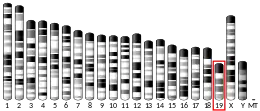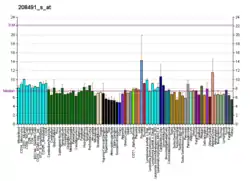PGM5
Phosphoglucomutase-like protein 5 is an enzyme that in humans is encoded by the PGM5 gene.[4][5][6]
| PGM5 | |||||||||||||||||||||||||||||||||||||||||||||||||||
|---|---|---|---|---|---|---|---|---|---|---|---|---|---|---|---|---|---|---|---|---|---|---|---|---|---|---|---|---|---|---|---|---|---|---|---|---|---|---|---|---|---|---|---|---|---|---|---|---|---|---|---|
| Identifiers | |||||||||||||||||||||||||||||||||||||||||||||||||||
| Aliases | PGM5, PGMRP, phosphoglucomutase 5 | ||||||||||||||||||||||||||||||||||||||||||||||||||
| External IDs | OMIM: 600981 MGI: 1925668 HomoloGene: 74881 GeneCards: PGM5 | ||||||||||||||||||||||||||||||||||||||||||||||||||
| |||||||||||||||||||||||||||||||||||||||||||||||||||
| |||||||||||||||||||||||||||||||||||||||||||||||||||
| |||||||||||||||||||||||||||||||||||||||||||||||||||
| |||||||||||||||||||||||||||||||||||||||||||||||||||
| Wikidata | |||||||||||||||||||||||||||||||||||||||||||||||||||
| |||||||||||||||||||||||||||||||||||||||||||||||||||
References
- GRCm38: Ensembl release 89: ENSMUSG00000041731 - Ensembl, May 2017
- "Human PubMed Reference:". National Center for Biotechnology Information, U.S. National Library of Medicine.
- "Mouse PubMed Reference:". National Center for Biotechnology Information, U.S. National Library of Medicine.
- Edwards YH, Putt W, Fox M, Ives JH (Mar 1996). "A novel human phosphoglucomutase (PGM5) maps to the centromeric region of chromosome 9". Genomics. 30 (2): 350–3. doi:10.1006/geno.1995.9866. PMID 8586438.
- Moiseeva EP, Belkin AM, Spurr NK, Koteliansky VE, Critchley DR (Jul 1996). "A novel dystrophin/utrophin-associated protein is an enzymatically inactive member of the phosphoglucomutase superfamily". Eur J Biochem. 235 (1–2): 103–13. doi:10.1111/j.1432-1033.1996.00103.x. PMID 8631316.
- "Entrez Gene: PGM5 phosphoglucomutase 5".
Further reading
- Strausberg RL, Feingold EA, Grouse LH, et al. (2003). "Generation and initial analysis of more than 15,000 full-length human and mouse cDNA sequences". Proc. Natl. Acad. Sci. U.S.A. 99 (26): 16899–903. Bibcode:2002PNAS...9916899M. doi:10.1073/pnas.242603899. PMC 139241. PMID 12477932.
- Wakayama Y, Inoue M, Kojima H, et al. (2000). "Aciculin and its relation to dystrophin: immunocytochemical studies in human normal and Duchenne dystrophy quadriceps muscles". Acta Neuropathol. 99 (6): 654–62. doi:10.1007/s004010051176. PMID 10867799. S2CID 20949507.
- Moiseeva EP, Critchley DR (1997). "Characterisation of the promoter which regulates expression of a phosphoglucomutase-related protein, a component of the dystrophin/utrophin cytoskeleton predominantly expressed in smooth muscle". Eur. J. Biochem. 248 (3): 634–43. doi:10.1111/j.1432-1033.1997.00634.x. PMID 9342213.
- Belkin AM, Klimanskaya IV, Lukashev ME, et al. (1994). "A novel phosphoglucomutase-related protein is concentrated in adherens junctions of muscle and nonmuscle cells". J. Cell Sci. 107 (1): 159–73. doi:10.1242/jcs.107.1.159. PMID 8175905.
- Belkin AM, Burridge K (1995). "Association of aciculin with dystrophin and utrophin". J. Biol. Chem. 270 (11): 6328–37. doi:10.1074/jbc.270.11.6328. PMID 7890770.
- Belkin AM, Burridge K (1995). "Localization of utrophin and aciculin at sites of cell-matrix and cell-cell adhesion in cultured cells". Exp. Cell Res. 221 (1): 132–40. doi:10.1006/excr.1995.1360. PMID 7589238.
This article is issued from Wikipedia. The text is licensed under Creative Commons - Attribution - Sharealike. Additional terms may apply for the media files.


